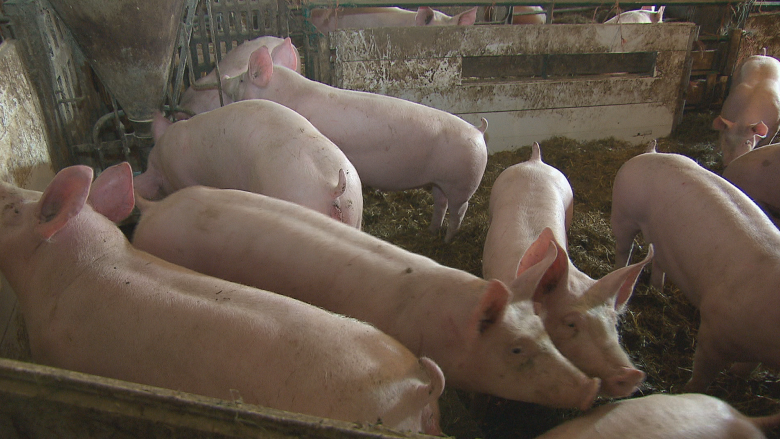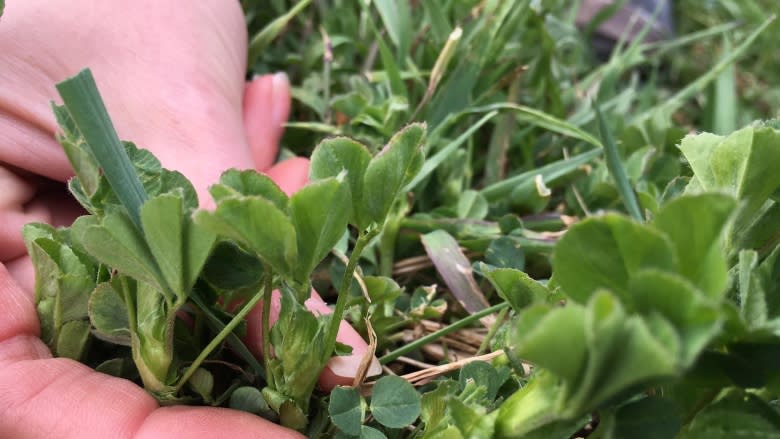Genetically modified alfalfa coming to Eastern Canada concerns farmers
A Petitcodiac farmer and other groups are stepping up their efforts to halt the spread of genetically modified alfalfa from being planted in Eastern Canada and are hoping consumers will join their fight.
The Canadian Food Inspection Agency allowed the strain to be registered for sale in Canada in April 2013, but it is now being made available for spring planting in Ontario and all provinces east.
A Petitcodiac farmer and other groups say they don't want this alfalfa in the province because of concerns about cross contamination with natural types.
"I'm not interested in genetically modified crops," said Murray Bunnet, a life-long farmer in Petitcodiac.
He grows alfalfa as food for his chickens, pigs and cows to graze.
Bunnet has been following the approval of genetically modified alfalfa to be made available for sale in Canada and the region.
He knows Health Canada and the CFIA approved the strain, but he still isn't convinced that genetically modified alfalfa won't make its way onto farmers' fields who don't want it there.
"It's a challenge because once that genetically modified alfalfa is there, it will cross-pollinate with other alfalfa and then it will spread from farm to farm, even though if you don't want it, which we don't," he said.
Bunnett doesn't want genetically modified products on his property because he doesn't think enough time has passed to know the full effects of these crops.
"Why are we messing with something that we don't know all the results," he said.
He also said it matters to the people who buy food from him.
"We do hear from customers that they don't want any genetically modified products in the food they are eating," he said.
Unfounded fears
But Mike Peterson, the lead for global traits at Forage Genetics International, said fears like Bunnett's are unfounded.
"It's fine if they want to be concerned but the idea that there's going to this mass contamination, there's absolutely no proof, there's no support for that whatsoever from the U.S. experience that that's going to happen in Canada," Peterson said.
Peterson said that cross contamination is less likely because the genetically modified alfalfa is being sold as a hay crop.
"With seed crops you move the pollen and you've got [genetically engineered] seed in a neighbouring field but we're not growing seed, we're growing hay and we're cutting the alfalfa way before there's any seed production," he said.
But some groups remain skeptical, however.
Groups continue fight
The National Farmers' Union is calling for the federal government to stop genetically modified alfalfa seed from being released anywhere in the country.
And Lucy Sharratt, the co-ordinator with the Canadian Biotechnology Action Network, said it's an issue that some farmers will continue to raise with government.
"Just this month 15 farm organizations wrote a joint letter asking the minister to stop the further release of GM alfalfa seed," Sharratt said.
The province's Department of Agriculture would not comment on the issue, saying the federal government has authority over new plant strains.
This isn't the first time that Bunnet has spoken out against the release of GM alfalfa in Canada before.
But since the seed is now for sale in the region, the Petitcodiac farmer said he feels consumers will have to pick up the torch.
"I think consumers need to get on board and talk to government and say, speak up more and say that we don't want this, so the government knows from people that they are not interested," he said.
He said as things stand now, anyone concerned with whether their meat was fed with genetically modified alfalfa, they will have to go straight to the source.
"You'd have to talk to the individual farmer that you're buying your food from and ask them directly. They'll be able to tell you," he said.
"But if you go into a grocery store, there, it's pretty difficult."



